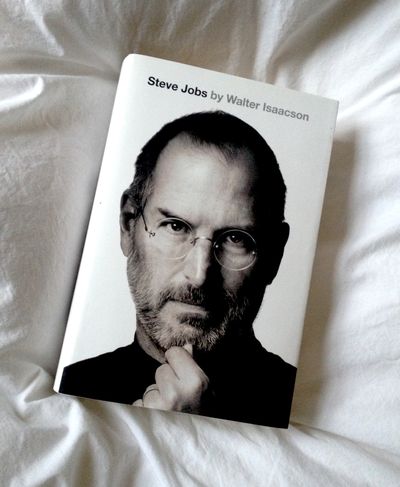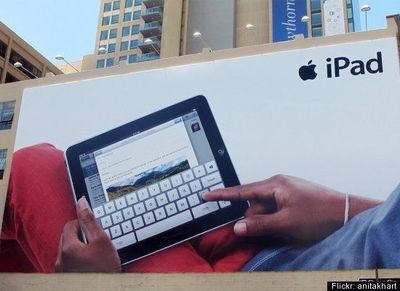progress and the unreasonable man – thoughts on Steve Jobs
I finally read the biography of Steve Jobs by Walter Isaacson. It's a heavy tome (I'm sure Jobs would have specified a slimmer design), too big to carry about, and I generally read when I'm travelling, so it wasn't until I downloaded an electronic copy that I got stuck into it. I can recommend it for anyone who's interested in business, tech, the creative industries or Jobs himself.
Jobs comes across as an obnoxious, perfectionist weirdo who managed, in his own words, to 'put a dent in the universe', seemingly by sheer force of will. He was an unusual combination of hippy drop-out, inspired creative thinker and business mogul, with an obsessive compulsion for everything around him to be 'just right'. A revealing incident in the book relates how he was under sedation while being treated for cancer and the doctors tried to put a mask over his face.
Jobs ripped it off and mumbled that he hated the
design and refused to wear it. Though barely able to speak, he ordered
them to bring five different options for the mask and he would pick a
design he liked. . . . He also hated the oxygen monitor they put on his
finger. He told them it was ugly and too complex.
Yeah, I've worked with some designers like that.
Jobs's perfectionism and need for total control led him to create a completely self-contained system in which software and hardware were integrated and even the retail channel was owned by the brand. He specified everything from packaging to the colour of the walls in the factory and even deliberately had the products engineered so they couldn't be opened without specialist tools, to prevent people from so much as changing a battery. Once perfection had been achieved he didn't want anyone to tamper with it. When working on the specifications for Apple's new HQ, the architects wanted the windows to open, but Jobs rejected this. He “had never
liked the idea of people being able to open things. ‘That would just
allow people to screw things up.’ ”
The book touches on Jobs's approach to advertising and branding at a number of points.
It relates that in briefing Chiat/Day for the launch of the Macintosh, he demanded something as revolutionary as he believed the product itself to be. "I want something that will stop people in their tracks," He said. "I want a thunderclap."
A thunderclap is what he got.
Here's Jobs previewing the ad to the Apple sales force at an internal event in 2003.
The salesforce get it. But when he showed '1984' to the board of Apple, "Many of them thought it was the worst commercial they had ever seen." The board tried to pull the campaign but Lee Clow claims that Chiat/Day lied and told them they couldn't sell the 60s Superbowl slot. (That's such a great story that I really hope it's true.) The screening caused a sensation and '1984' has been described as the greatest TV ad of all time.
The concept (1984) captured the zeitgeist of the personal
computer revolution. Many young people, especially those in the
counterculture, had viewed computers as instruments that could be used
by Orwellian governments and giant corporations to sap individuality…
The ad cast Macintosh as a warrior for (personal empowerment) – a cool,
rebellious and heroic company that was the only thing standing in the
way of the big evil corporation's plan for world domination and total
mind control. Jobs liked that. He fancied himself as a rebel and he
liked to associate himself with the values of the ragtag band of hackers
and pirates he recruited to the Macintosh group...The ad was a way of reaffirming, to himself and to the world, his desired self image.
If Jobs identified himself with the message in '1984' then 'Here's to the crazy ones' must have seemed like a personal manifesto.
Here’s to the crazy ones. The misfits. The rebels. The troublemakers.
The round pegs in the square holes. The ones who see things differently.
They’re not fond of rules. And they have no respect for the status quo.
You can quote them, disagree with them, glorify or vilify them. But the
only thing you can’t do is ignore them. Because they change things.
They push the human race forward. While some may see them as the crazy
ones, we see genius. Because the people who are crazy enough to think
they can change the world, are the ones who do.
You get the sense that this is exactly how Jobs saw himself – a rebellious genius who pushed the human race forward, despite the carping of critics. People talk of Jobs's 'reality distortion field'; when
reality didn't suit him he ignored it, or sought to overturn it, or persuaded others that they could do so.
Here's Jobs in 1997, presenting 'Here's to the Crazy Ones' in another Apple keynote speech, when he had returned to the company as interim CEO. At this point Apple sales had slumped, their product line-up was weak and they had yet to launch the iMac or iPod. He needed to remind Apple fans and employees what Apple stood for, at its core and how they were going to return to those values. It's interesting to hear one of the world's great marketers speak about branding and marketing in such clear, simple terms.
The book goes on:
Starting with the 'Think Different' campaign and continuing through the rest of his years at Apple, Jobs held a freewheeling three-hour meeting every Wednesday afternoon with his top agency, marketing and communications people to kick around messaging strategy. "There's not a CEO on the planet who deals with marketing the way Steve does," said Clow. "Every Wednesday he approves each new commercial, print ad and billboard." At the end of the meeting he would often take Clow and his two agency colleagues Duncan Miller and James Vincent, to Apple's closely guarded design studio to see what products were in the works. "He gets very passionate and emotional when he shows us what's in development," said Vincent. By sharing with his marketing gurus his passion for the products as they were being created, he was able to ensure that almost every ad they produced was infused with his emotion."
Jobs was responsible for some amazing work, but he was a demanding client. He responded to the first draft of 'The Crazy Ones' with the words, "It's advertising agency shit and I hate it!' He told copywriter James Vincent that he hated the iPad launch work.
"Your commercials suck," he said. "The iPad is revolutionizing the world and we need something big. You've given me small shit."
“Well, what do you want?” Vincent shot back. “You’ve not been able to tell me what you want.”
“I don’t know,” Jobs said. “You have to bring me something new. Nothing you’ve shown me is even close.”
Vincent argued back and suddenly Jobs went ballistic. “He just started
screaming at me,” Vincent recalled. Vincent could be volatile himself,
and the volleys escalated.
When Vincent shouted, “You’ve got to tell me what you want,” Jobs shot
back, “You’ve got to show me some stuff, and I’ll know it when I see
it.”
The book explains how the agency presents twelve different campaigns, from inspirational and stirring to humorous, to celebrity endorsement. Further campaigns are developed and produced, but Steve still isn't happy.
He had been asking for ads that were different and new but eventually he realised he did not want to stray from what he considered the Apple voice. For him that voice had a distinctive set of qualities: simple, declarative, clean…And so they went back to a clean white background, with just a close-up showing off all the things that "iPad is" and could do.
Not so much the creative visionary, more the client who doesn't know what he wants until he sees it and makes you do a ton of work before he decides he liked the first thing best.
Despite all this, I have to say I would have jumped at the chance to work with the obsessive, perfectionist weirdo that was Steve Jobs.
In the words of George Bernard Shaw, "The reasonable man adapts himself to the world; the unreasonable one
persists in trying to adapt the world to himself. Therefore all progress
depends on the unreasonable man.' Jobs was clearly unreasonable: he succeeded in adapting the world around him to fit himself. He couldn't have achieved so much without being unreasonable; the interesting question is whether he could have done it without being so unpleasant.
I've heard people in this business say we should "tolerate genius". (I think David Ogilvy said it first.) I've also heard Dan Wieden say, "Life's too short to work with assholes." There are few geniuses in advertising, no Lennons or Picassos or Dylans, but there are plenty of assholes. I've been lucky enough to work with some exceptional talents who are unreasonable enough to achieve greatness in our field, without being unpleasant in the process. Wieden is one of the few. Those people are never easy to work with, but they are crazy enough to believe they can make a difference. And the ones who are crazy enough to believe that are the ones who do.


